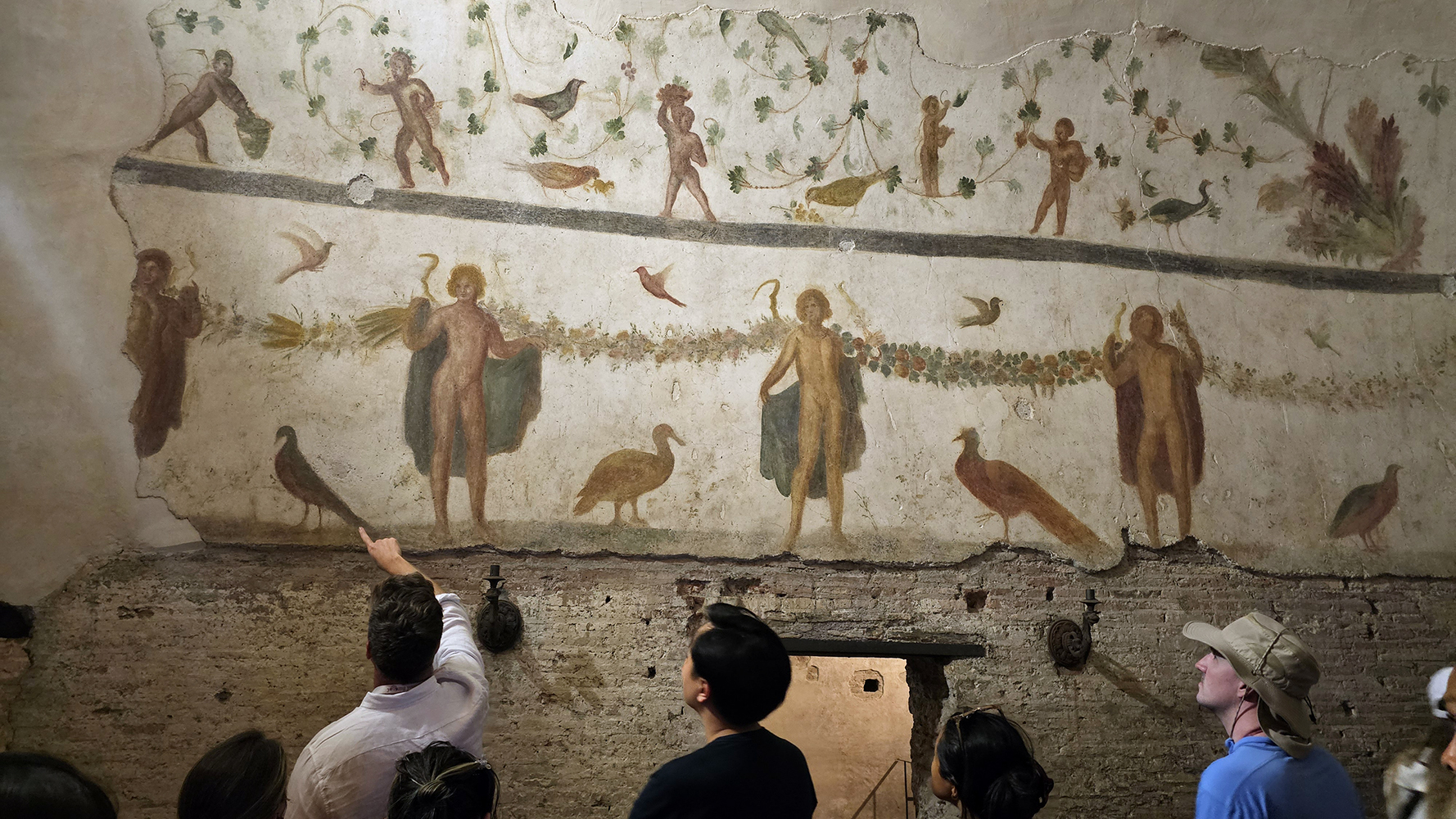
Evan Jewell leads the 2024 Classical Summer School in a visit to Case Romane on the Caelian Hill in Rome (photograph by Gina Greene)
Extended Deadline
Given that the application portal opened slightly later this year than in the past, we have extended the application deadline to Friday, December 12, 2025.
Overview
This five-week program provides qualified graduate students, and middle school, high school, and college/university teachers with a well-grounded understanding of the growth and development of the city of Rome through a careful study of material remains and literary sources.
Rome began as a cluster of Iron Age huts on a hill overlooking the Tiber River. This tiny settlement eventually grew to become the capital of an empire that stretched across the entire Mediterranean basin. The city’s development reflects its long and complex relationships with the other peoples of the Italian peninsula, in particular the Etruscans and Greeks, as well as multiple influences from individuals and groups who came to the city as enslaved persons, merchants, or immigrants. Continuously inhabited since its foundation, the city has been frequently rebuilt, with layer rising upon layer. This program gives participants a deep understanding of ancient Rome’s urban setting (from the Etruscan/early Roman period through late antiquity) and the contiguous development of its colonies and neighbors in the Italian peninsula. Through close attention to both textual sources—from narrative histories to inscriptions—and the material evidence of ancient art and architecture, the program participants recover and reconstruct the diverse experiences of multiple groups that gave rise to the city of Rome.

In 2026, the program will focus on three regions: Etruria, the Bay of Naples, and Rome. The first week will be based in Rome and the region of Etruria, primarily researching the early development of Rome, Etruscan and Faliscan cities and cemeteries, as well as early Roman colonies. The program then moves to Naples in the second week, studying Magna Graecia (Paestum) and the development of towns and villas around the bay and its hinterland prior to the eruption of Vesuvius in 79 CE. We then move back to the center—Rome itself—in its last three weeks and focuses on topographically oriented study of the city and its rise, complemented by a few day trips to key sites in the region of Latium.
Director
Dr. Evan Jewell, Assistant Professor of History, Rutgers University-Camden
Email: cssdirector [at] aarome.org (cssdirector[at]aarome[dot]org)
2026 Program Dates
Sunday, June 14–Saturday, July 18, 2026
Application Deadline
Friday December 12, 2025, 11:59 PM EST
Letters of recommendation must be submitted by this deadline to receive full consideration.
Notification of acceptance: early-January 2026
Notification of AAR scholarships: mid-January 2026
Costs & Lodging
The program fee of $5,000 includes tuition, accommodation, lunches (on excursion days) and some dinners, and the cost of trips to sites included in the program (including transportation to sites). Participants without sources of funding are eligible for an American Academy in Rome scholarship (minimum of $1,500). While we work to provide scholarship support for all participants, high school teachers will receive priority.
During the first two weeks of the program, participants will be housed in hotels inside and outside of Rome, in single rooms or double rooms (two beds in a shared room). For the last three weeks of the program, participants will be housed in shared apartments in Rome. The program fee does not include airfare, personal expenses (or additional, unplanned expenditures), some lunches/dinners, any travel not directly related to the program of the Classical Summer School, nor expenses such as laundry, tips, amusements, or shopping.

Application Materials
An application consists of a completed online application form, personal statement (up to 500 words), Curriculum Vitae, two (2) letters of recommendation, and, for undergraduate and MA candidates only, academic transcripts. The personal statement should specify intellectual motivations for participating in the program, and how this summer school will complement your existing knowledge. At least one of the letters of recommendation should be able to speak to the applicant’s ability to participate effectively in an intensive academic and social environment. Please thoroughly read the 2026 Program Guidelines (link below) before completing the Classical Summer School application.
Scholarship & Payment
Participants without sources of funding are eligible for an American Academy in Rome scholarship (minimum of $1,500). Several other larger scholarships are offered through the American Academy in Rome and can be applied for as part of the program application.
Applicants are also strongly encouraged to apply for funding and scholarships offered through their home institution, regional, and state classical organizations, however, these applications are submitted independently from the Classical Summer School application.
Successful applicants will be asked to pay a non-refundable deposit of $200 to hold their place. Program fee must be paid in full by May 1, 2026.
